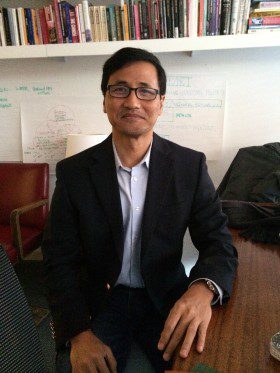 Harvard is a long way from rural Chittagong Hill Tracts in Bangladesh, but that hasn’t stopped Maung Nyeu, currently an Ed.D. candidate at the Harvard Graduate School of Education, from trying to make a difference for children there.
Harvard is a long way from rural Chittagong Hill Tracts in Bangladesh, but that hasn’t stopped Maung Nyeu, currently an Ed.D. candidate at the Harvard Graduate School of Education, from trying to make a difference for children there.
SAI talked with Nyeu about his work with Our Golden Hour, a nonprofit working to improve educational opportunities for indigenous children in Bangladesh and to preserve indigenous culture through education.
The tumultuous history of Bangladesh means that for many children, getting a good education is not a reality. Chittagong Hill Tracts is a mountainous, rural area where many indigenous people live; a population that is distinct in language, culture, and religion from the majority of the Bengali population.
Increasing militarization in the region has led to traditional farmlands being given to incoming Bengali settlers, and according to Amnesty International, tens of thousands of people are landless because of the failure of the Bangladeshi government to uphold the legal rights of the lands in this area and not recognize indigenous people. As a result, many people are internally displaced.
This has led to violent clashes between local people and Bengali settlers – a life of massacres, village burnings, and girls being sold into the sex trade, hardly the environment that ensures a quality education for many children. More than half of the residents have no formal schooling.
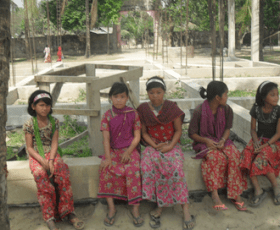
Children in Chittagong Hill Tracts
Moreover, one of the biggest problems blocking children from attending school is a language barrier. As a result of the government’s one-language policy, most of the instruction is in Bangla, which most children in Hill Tracts do not know. Unable to keep up with an education in a language that is not native to them, many children drop out.
Nyeu himself grew up in Hill Tracts, and was able to break the cycle by being educated at American universities, first getting a degree in engineering, and then an MBA from the University of Southern California. He knew first-hand the obstacles facing children in the area, and set out to make a difference: “I realized that, these children, growing up without any education, their future is robbed of them without any fault of their own. They are victims,” he says.
After his education in the US, he returned to his home region and built the Padmau Residential Education Center, which provides educational opportunities to disadvantaged children so that they can go to school in their own indigenous language. He says that the demand for an education was so high, that he had to turn some students away because of a lack of resources. He launched a nonprofit, Our Golden Hour, and continued to look for ways to help children in Hill Tracts.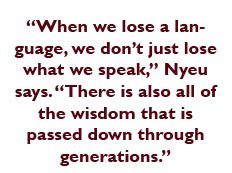
He recognized that many students were missing out on a quality education because the government was not providing adequate schools in rural areas, which forced children to go far from their family for an education. Nyeu focused on building more schools for children in younger grades close to rural villages, so that students do not have to leave their homes and families or walk long distances to get an education.
Through his work with this school, he developed a deeper understanding of the challenges facing children in the region. He realized that the language problem was not only hurting kids in their education – it was a barrier to preserving their culture.
Nyeu realized that not only are children not being instructed in their native language, they are also being taught with content that is not culturally relevant to their own indigenous culture. “When we lose a language, we don’t just lose what we speak,” Nyeu says. “There is also all of the wisdom that is passed down through generations.”
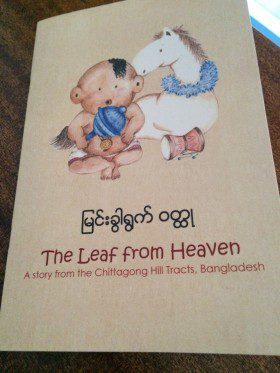
An example of a children’s book that was translated to English
While talking to locals about this problem, he found that it was a concern for many people. He recalls one woman telling him, ‘‘Language isn’t just a tool for communication – it’s how our ancestors speak to us. It’s how we learn meaning in the world.” Without a space where their culture and language is nurtured, Nyeu said that these people are gradually losing their culture.
Nyeu then realized that his education initiatives could help solve this problem. He launched the Oral History Project, which is working to solve this problem by ingeniously making children ‘co-creators’ in their education, which is also a focus of his dissertation research at HGSE.
His method asks teachers to give their students an assignment: Interview their grandfather, grandmother, or an elder and ask them to tell the student a story, which they share at school. Someone records the presentation, and travels to the nearest town with computer access and sends the video to the team at Harvard.
Nyeu then translates the story into English, and works with a children’s book author and illustrator to create a beautiful, colorful children’s story that goes back to the classrooms in Bangladesh. This allows teachers to instruct students about their own culture, in their own language. These are stories that have been passed down orally for hundreds of years, and are for the first time printed in books.
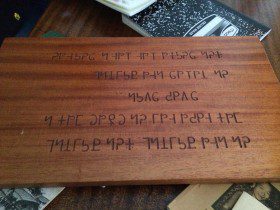
A wood carving of an indigenous language, which is brought to classroom in Bangladesh
For example, Nyeu says that he now has a physical book telling a story that he heard countless times from his grandmother as a child. This is strengthening the culture for generations to come. “If the children grow up learning the language, learning to speak and write in the language, and developing a sense of confidence about their culture and language, after some years, they will become a teacher in our school, and they will educate the next generation of students,” he says.
Through his work with Our Golden Hour, Nyeu is not only giving children of Hill Tracts a valuable education, he is saving their lives. The name for his charity reflects this idea: “In the ER, this is common knowledge among physicians: If someone has an accident, if you can bring the person to the emergency room within 1 to 2 hours of the incident, the probability of saving life and preventing long-term damage increases 70 to 90 percent,” he says.
“For our children in the Chittagong Hill Tracts, we saw that if the child doesn’t go to school within 5 to 11 years [of age], this is a window. So for our children, these 5 to 11 years, it is a Golden Hour,” he explains. “If we need to save them, this is why we need to bring them to school and get them an education.”
Read more about Our Golden Hour here.
-Meghan Smith
